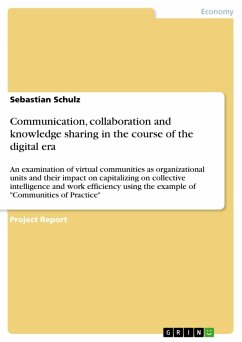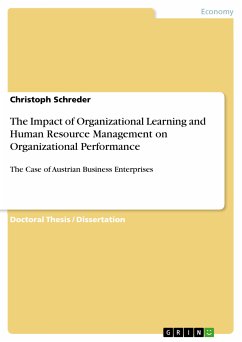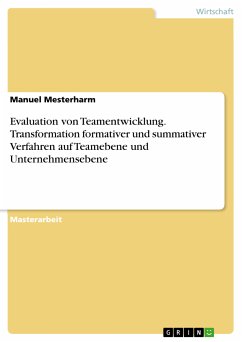Project Report from the year 2013 in the subject Leadership and Human Resources - Miscellaneous, grade: 1,0, University of Cooperative Education Stuttgart; Horb, language: English, abstract: Abstract This paper explores the practicable establishment of local Communities of Practice (CoP) on a virtual level to foster the augmentation of knowledge, sharing of practice and employee development. Communities of Practice have been identified as important sites of learning through creating and sharing knowledge within its social structures. The thesis examines how learning develops in this context and constitutes the basic theoretical attainment that is aligned to CoP. Furthermore, the paper reviews how technology can be introduced to reinforce communication and collaboration within the community. In order to build an understanding of how CoP create organizational value, the thesis not only focuses on the acknowledged learning theory models but also on the characteristics and benefits of those communities themselves as well as on virtual communities in general. Significant learning opportunities are identified within those communities, which are affirmed through a well-founded literature review on the topics "Learning Organizations", "Web-based Learning" and "Development of a framework for Human Resource Development". The review includes the identification of the HR-professional as a key player and stakeholder within the context of establishing a digitised CoP. The paper concludes with a navigator that has been evolved through merging the major findings of the literature analysis, the field research (expert-interviews) and personal contribution. Keywords - Community of Practice, Learning Theory, Knowledge Transfer, Digitised Community of Practice, Virtual Communities, Collaboration, Human Resource Development Table of Contents List of Abbreviations IV List of Graphics V Abstract VI 1. Introduction 2 1.1 Problem and Purpose 2 1.2 Approach to the Thesis and outline 4 2. Literature Review 6 2.1 The virtual community 6 2.1.1 Terms and Definitions 6 2.1.2 History of virtual communities 7 2.1.3 A typology of virtual communities 8 2.1.4 Virtual communities for learning and development 9 2.2 Learning Theory 11 2.2.1 Situated Learning and Legitimate Peripheral Participation 11 2.2.2 Organizational Learning in Communities of Practice 12 2.2.2.1 Community of Practice as social learning systems 13 2.2.2.2 Online collaborative learning 14 2.3 Community of Practice 18 2.3.1 Terms and Definitions 18 2.3.2 Characteristics of Community of Practice 18
Dieser Download kann aus rechtlichen Gründen nur mit Rechnungsadresse in A, B, BG, CY, CZ, D, DK, EW, E, FIN, F, GR, HR, H, IRL, I, LT, L, LR, M, NL, PL, P, R, S, SLO, SK ausgeliefert werden.









